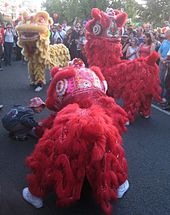- Demographics of Auckland
-
Auckland is New Zealand's most populous city. In the 2006 census, 1,303,068 persons declared themselves as residents of the Auckland region — about one-third (32.28%) of New Zealand's total population.[1] Auckland is known for having a large multicultural mix with the largest Polynesian city in the world.
While having strong natural population growth, Auckland also has significant internal (from New Zealand) and external (from overseas) immigration. During the last decade up to 2011, approximately 50 people per day moved to Auckland, requiring an average of 21 new homes, and occupying in excess of one extra hectare of land a day.[2]
Ethnicity
The proportion of Asians and other non-European immigrants has increased during the last decades due to immigration,[3] and the removal of restrictions directly or indirectly based on race. Immigration to New Zealand is heavily concentrated towards Auckland (partly for job market reasons). This strong focus on Auckland has led the immigration services to award extra points towards immigration visa requirements for people intending to move to other parts of New Zealand.[4]
The following table shows the ethnic profile of Auckland's population, as recorded in the 2001 and 2006 New Zealand Census. The percentages add up to more than 100%, as some people counted themselves as belonging to more than one ethnic group. Figures for 2006 refer to the whole Auckland Region, not just the urban area. The substantial percentage drop of 'Europeans' was mainly caused by the increasing numbers of people from this group choosing to define themselves as 'New Zealanders' — even though this was not one of the groups listed on the census form.
 Auckland's fastest growing ethnic groups are Asian. Here, lion dancers perform at the Auckland Lantern Festival.
Auckland's fastest growing ethnic groups are Asian. Here, lion dancers perform at the Auckland Lantern Festival.
Ethnic Group 2001 (%)[5] 2001 (people) 2006 (%)[6] 2006 (people) New Zealand European 66.9 684,237 56.5 698,622 Pacific Island 14.9 152,508 14.4 177,936 Asian 14.6 149,121 18.9 234,222 Māori 11.5 117,513 11.1 137,133 Middle Easterners/Latin Americans/Africans n/a n/a 1.5 18,555 Others 1.3 13,455 0.1 648 'New Zealanders' n/a n/a 8.0 99,258 Total giving their ethnicity 1,022,616 (individuals) 1,237,239 (individuals) The 2006 Census also provides information about the multilinguality of the region. 867,825 people in the Auckland Region spoke one language only, 274,863 spoke two, and 57,051 three or more.[6]
Future growth
Auckland is expecting substantial population growth via immigration and natural population increases (which contribute to growth at about one-third and two-thirds, respectively)[7], and is set to grow to an estimated 2 million inhabitants by 2050.[8] This substantial increase in population will have a major impact on transport, housing and other infrastructure that is in many cases already considered under pressure. It is also feared by some organisations, such as the Auckland Regional Council, that urban sprawl will result from the growth and, as a result, that it is necessary to address this proactively in planning policy.
A 'Regional Growth Strategy' has been adopted that sees limits on further subdivision and intensification of existing use as its main sustainability measures.[9] This policy is contentious, as it naturally limits the uses of private land, especially the subdivision of urban fringe properties,[10] by setting 'Metropolitan Urban Limits' in planning documents like the District Plan.[11] According to the 2006 Census projections, the medium-variant scenario shows that the population is projected to continue growing, to reach 1.93 million by 2031. The high-variant scenario shows the region's population growing to over two million by 2031.[citation needed]
References
- ^ http://www.stats.govt.nz/Census/2006CensusHomePage/QuickStats/AboutAPlace/SnapShot.aspx?id=1000002&type=region&ParentID=
- ^ "Auckland Council - History In The Making". Our Auckland. Auckland Council: p. 5. March 2011.
- ^ "New Zealand — A Regional Profile — Auckland" (PDF). Statistics New Zealand. 1999. pp. 19–20. Archived from the original on 2007-10-25. http://web.archive.org/web/20071025142501/http://www.stats.govt.nz/NR/rdonlyres/7F0D2AFF-54F4-4CE9-BE7C-974597403FCB/0/Auckland.pdf. Retrieved 2007-10-03.
- ^ Residence in New Zealand (PDF) (Page 8, from the Immigration New Zealand website. Accessed 2008-01-18.)
- ^ 2001 Regional Summary (from the Statistics New Zealand website)
- ^ a b Quickstats about Auckland Region
- ^ Can We Stop growth? (from the ARC website)
- ^ Executive Summary (PDF) (from the Auckland Regional Growth Strategy document, ARC, November 1999. Retrieved 2007-10-14.)
- ^ From Urban Sprawl to Compact City: an analysis of Auckland's Urban Growth Management Strategies — Arbury, Joshua — MA Thesis, University of Auckland, New Zealand.
- ^ Cumming, Geoff (28 April 2007). "Green belt under siege". The New Zealand Herald. http://www.nzherald.co.nz/topic/story.cfm?c_id=139&objectid=10436540. Retrieved 27 September 2011.
- ^ Growth Strategy: Glossary and References (PDF) (from the Auckland City Council).
Categories:- Demographics of New Zealand
- Geography of Auckland
- Demographics by city
Wikimedia Foundation. 2010.

